- Home
- Anthony Ryan
The Wolf's Call
The Wolf's Call Read online
Ace Books by Anthony Ryan
The Raven’s Shadow Novels
BLOOD SONG
TOWER LORD
QUEEN OF FIRE
The Draconis Memoria Novels
THE WAKING FIRE
THE LEGION OF FLAME
THE EMPIRE OF ASHES
The Raven’s Blade Novels
THE WOLF’S CALL
ACE
Published by Berkley
An imprint of Penguin Random House LLC
1745 Broadway, New York, NY 10019
Copyright © 2019 by Anthony Ryan
Penguin Random House supports copyright. Copyright fuels creativity, encourages diverse voices, promotes free speech, and creates a vibrant culture. Thank you for buying an authorized edition of this book and for complying with copyright laws by not reproducing, scanning, or distributing any part of it in any form without permission. You are supporting writers and allowing Penguin Random House to continue to publish books for every reader.
ACE is a registered trademark and the A colophon is a trademark of Penguin Random House LLC.
Library of Congress Cataloging-in-Publication Data
Names: Ryan, Anthony, author.
Title: The wolf’s call / Anthony Ryan.
Description: First edition. | New York: Ace, 2019. | Series: A Raven’s blade novel; 1
Identifiers: LCCN 2019003843 | ISBN 9780451492517 (hardcover) | ISBN 9780451492531 (ebook)
Subjects: | BISAC: FICTION / Fantasy / Epic. | FICTION / Fantasy / General. | GSAFD: Fantasy fiction.
Classification: LCC PR6118.Y3523 W65 2019 | DDC 823/.92—dc23
LC record available at https://lccn.loc.gov/2019003843
First Edition: July 2019
Cover art © Cliff Nielsen
Cover design by Judith Lagerman
Unified Realm map by Steve Karp, based on an original by Anthony Ryan
Kingdoms of the Far West map and Northern Prefecture map by Anthony Ryan
This is a work of fiction. Names, characters, places, and incidents either are the product of the author’s imagination or are used fictitiously, and any resemblance to actual persons, living or dead, business establishments, events, or locales is entirely coincidental.
Version_1
Dedicated to the memory of my late friend and one-time boss, Dr. Robin Cooper, PhD, who would have made a great Aspect of the Third Order
Contents
Ace Books by Anthony Ryan
Title Page
Copyright
Dedication
Acknowledgments
Maps
Part ILuralyn’s Account: The First Question
Chapter One
Chapter Two
Chapter Three
Chapter Four
Chapter Five
Chapter Six
Chapter Seven
Chapter Eight
Chapter Nine
Chapter Ten
Chapter Eleven
Part IIMap
Luralyn’s Account: The Second Question
Chapter Twelve
Chapter Thirteen
Chapter Fourteen
Chapter Fifteen
Chapter Sixteen
Chapter Seventeen
Chapter Eighteen
Chapter Nineteen
Chapter Twenty
Chapter Twenty-one
Chapter Twenty-two
Chapter Twenty-three
Chapter Twenty-four
Part IIILuralyn’s Account: The Third Question
Chapter Twenty-five
Chapter Twenty-six
Chapter Twenty-seven
Chapter Twenty-eight
Chapter Twenty-nine
Chapter Thirty
Chapter Thirty-one
Chapter Thirty-two
Chapter Thirty-three
Chapter Thirty-four
Dramatis Personae
About the Author
Acknowledgments
Thanks once again to my US editor, Jessica Wade, and my UK editor, James Long, for their helpful input and advice in bringing Vaelin Al Sorna’s next adventure into the world. Thanks also to my agent, Paul Lucas, for all his efforts on my behalf, and Paul Field, my ever-vigilant second set of eyes.
PART I
The raven’s blade
Cuts deep,
Laying bare my sins.
—SEORDAH POEM, AUTHOR UNKNOWN
LURALYN’S ACCOUNT
The First Question
There are many these days who call my brother a monster. They speak of his deeds, both dreadful and wondrous, as the work of a preternatural beast that had somehow taken on the form of a man to wreak the greatest havoc upon the world. There are others, in the more shadowed and wretched corners of the earth, who still call him a god, though when they do, the word is always spoken in a fearful whisper. Curiously, neither those who think him monstrous nor those who think him divine ever speak his true name, even though they know it as well as I. Kehlbrand, my brother whom, despite it all, despite every battle, conquest and massacre, I still contrive to love. But, I hear you ask, most honoured reader, how can this be? How is it possible to harbour love for a man who bathed half the world in blood?
In these quieter days, far removed from the frenzy and terrors of war, I have the leisure to consider such questions. As the years pass and ever more grey creeps into the once-auburn mane that crowns my head, as yet more aches beset my joints and I squint ever closer at these pages as I write, it is this question I ponder most.
Honoured reader, rest assured that I know you did not open this volume to endure an old woman’s complaints. No, you wish to know of my brother and how he came to reshape the world entire. But his story cannot be told unless I also tell mine, for we were bound tight, he and I. Through blood and purpose, we were bound tight. For many years it was as if we shared a soul, so mirrored was our intent, our commitment to our holy mission. But the mirror, I have come to learn, is the worst of liars, and no mirror ever remains uncracked by time.
It has taken me years of contemplation to identify the moment when I became truly bound to Kehlbrand. Perhaps it was when I slipped from the back of my first horse at age seven and spent several moments whimpering over the bleeding scrape on my knee. It was Kehlbrand, just a day or so shy of his twelfth year, who came to me. As the other children of our Skeld laughed and threw dung at the sobbing weakling, it was my brother who came and helped me to my feet. Already he was long of limb with the leanness of a born warrior, standing at least a foot taller than I, as he would for the rest of our lives.
“Druhr-Tivarik, little colt,” he said, voice soft with concern as he spoke the priests’ term for those who carry the Divine Blood, thumbing the tears from my eyes, “do not weep.” With that, he gave a smile of apology before forming his features into the customary mask of harsh disdain and delivering an openhanded slap to my face. The blow was hard enough to send me to the ground with the iron sting of blood on my tongue.
I spent several seconds blinking in confusion, although I was surprised to find my tears had stopped flowing. Looking up through bleary eyes, I saw Kehlbrand advancing on the other children. He made straight for the tal
lest, a burly boy a year his elder named Obvar, who was always to be found at the forefront of my tormentors.
“Druhr-Tivarik,” my brother repeated, delivering a closed fist directly into Obvar’s face, “cannot be judged by the merely mortal.”
The subsequent fight was both lengthy and bloody, becoming something of a legend amongst the youngsters of the Skeld. It greatly overshadowed the insult done to a child of the Druhr-Tivarik, which was soon forgotten. This, I later realised, had been Kehlbrand’s intention, for the priests were given to punishing such things harshly. When it was over, Obvar lay groaning on the ground, bleeding from numerous cuts, whilst Kehlbrand, no less bloody, remained standing. As is often the way with boys, in the days that followed, he and Obvar became the closest of friends, remaining sworn saddle brothers until one particular and very fateful day some twenty years later. But, honoured reader, it appears I am getting ahead of myself.
But no, important lesson though it was, we were not truly bonded that day. Nor, strangely, the morning after I had my first True Dream. You must understand that the power of the Divine Blood is fickle. Although those of us fated to join the ranks of the Druhr-Tivarik are born to mothers with manifest gifts, such gifts are not always passed on. In many cases they lay dormant throughout childhood, only manifesting themselves with the onset of puberty. So it proved with me. At the dawning of my twelfth summer, the week of my first blood, the True Dream made itself known.
You must forgive my meagre literary skills, honoured reader, for I find it hard to convey in words the utter terror of that first dream. I use this term as I find the word “vision” somewhat silly, not to say inadequate. The True Dream is a state beyond reality, although it feels completely real to one captured in its throes. The confusion and dulled sensations of a mundane dream are not present. The feel of the air on skin, the scents carried by the wind, the warmth of a flame or the sting of a cut. All these are present, and felt in full.
That night, as I lay on my mats in the tent I shared with the other favoured children of the Skeld, I found myself claimed by a sleep as deep and absolute as any I had known. It was as if a black veil had been placed over my eyes, banishing all light and sensation, and when it was drawn aside, I found myself standing amidst horrors.
I remember the screams most of all. The pain of a dying soul is a hard thing to bear, especially if you have never heard it before. I had seen people die by then. Heretics, slaves and those who transgressed the Laws Eternal were routinely bound and forced to kneel beneath the executioner’s blade. But those deaths had been quick; a swift stroke of the sabre, and their heads would roll on the earth. Their bodies might twitch, sometimes their faces too. A ghastly sight for any child to witness but, still, mercifully brief. What I witnessed in that first True Dream was not lawful execution. It was battle.
The doomed man lay against the flank of a dead horse, eyes wide in terror and bafflement as he stared at the mess of entrails that had been his belly. His mouth gaped as he screamed, hands crimson with gore as they tried to stuff the gelatinous tubes back inside his body. Surrounding us was a maelstrom of thundering hooves, clashing blades and the shrill cries of distressed horses, all shrouded in a thick pall of dust.
Battle was a regular occurrence on the Iron Steppe in those days. It was a time when the Stahlhast endured a painful transition from disunited and endlessly feuding Skelds to what could be called a true nation. It seemed as if every other month the warriors would strap their bows to their saddles, and work stones over their sabres and lance points before mounting up to ride off in one great host. After days or perhaps weeks they would return, always victorious, the heads of enemies dangling from their saddles. Come the night they would drink and tell tales of their great deeds, tales I found did not match the nightmare that enfolded me now.
My eyes flicked from one horror to another, a crawling man trailing blood from the stumps of his legs, a horse thrashing in a pool of guts and shit leaking from sundered bowels, and there, amidst it all, Kehlbrand, my brother, standing tall.
As was his wont in battle, he wore no helm, the long braid of his hair whirling as he fought, beset by foes on all sides. There must have been a dozen of them, their armour embossed with the redbird sigil of the Rikar Skeld, our most hated enemy. Time after time they came for him, and time after time his sabre cut them down. My brother moved as if in a dance, sidestepping every thrusted lance, ducking every slashing blade and leaving a trail of corpses in his wake. He seemed invincible, unstoppable, making my heart swell with pride despite the continuing nightmare all around. But, as I have learned many times since, there is no such thing as an invincible warrior.
It was as Kehlbrand cut down that last of his enemies, a broad, brute-faced man with a patch over one eye, that the Rikar archer appeared out of the dust. He rode a tall white stallion at full gallop, leaning low over the saddle, face set in the concentrated stare of the expert as he aimed his shaft. I screamed a warning to my brother, but though I put all my strength into the shout, my brother heard nothing. The True Dream makes the dreamer a witness, but never a participant.
The arrow took Kehlbrand in the back of the neck, piercing him all the way through so that the steel head emerged from his throat by several inches. Had he worn a helm he might have lived. I watched him stagger briefly, staring down at the crimson arrowhead with curious detachment, his expression one of mild surprise. Then he fell, collapsing to the earth as all life fled his body.
I woke screaming, much to the annoyance of the other children. Two days later word came that the Rikar had ambushed one of our hunting parties and battle would be required to settle the insult. I sought Kehlbrand out amongst the gathering warriors. It was custom for relatives to gift tokens to those called to war, so I attracted little attention as I approached my brother. He, however, regarded me with amused surprise, knowing it was my habit to shun such things.
“Thank you, little colt,” he said as I pushed the small wooden carving into his hands. It was a rendering of a horse I had crafted myself, something my modesty doesn’t prevent my saying I have always excelled at. “This is very fine . . .”
He fell silent as I moved closer, standing on tiptoe to wrap my arms around him, whispering softly into his lowered ear, “Turn after you kill the man with the eye patch. Watch for the archer on the white horse.” I released him and made to leave, then paused. “And you really should wear a helm in future.”
I walked swiftly away, heart hammering. I had told no one else of the True Dream, nor did I ever intend to. Others might relish the onset of their Divine gifts and run to tell the priests the happy news. I knew better.
The warriors returned seven days later whilst I sat alone in the tent, staring at the open flap through teary eyes. I remember being unsurprised when Kehlbrand appeared, stooping low to sink down beside me. Instead, I felt only a grim certainty. My brother was a true warrior of the Hast, and his duty was clear. Those with manifest gifts must be taken to the Great Tor and given to the priests.
Kehlbrand regarded me in silence for a long time, his expression contemplative rather than awed. Finally, he said in a toneless voice, “I kept the white stallion. My gift to you.”
I nodded, swallowing, my throat as dry as sand. “I’ll ride him when you take me to the priests,” I said, the words spoken in a thin rasp.
“Why,” he said, reaching out to cup my face, “would I ever do that, little colt?”
“They’ll know. They always know . . .”
“Hush.” He thumbed away the tears welling in my eyes and reached into his pack. “I have another gift for you.”
The tooth was long and white, the base fitted with a silver clasp attached to a chain. The tooth itself was inscribed with blackened script of some kind. I could read the letters of the Merchant Realms, but this was unknown to me. “Plucked from the jaw of a white tiger,” Kehlbrand said. “Many seasons ago I sought out an old woman in the northern w
astes said to be wise in the ways of the Divine Blood. She swore this will conceal it from the priests, and bargained me up to three horses and a nugget of gold before she would give it up. Like you, I worried the priests might come for me if the power ever quickened in my blood. Since it appears that will never happen,” he said, splaying the chain and lifting it over my head, the metal chill on my neck as he settled it in place, “now, I give it to you.”
But even this, though it drew us closer, made us truly brother and sister rather than just the issue of the same womb, this was not the final seal on the knot that bound us. The act that truly entwined our souls came on the day we were summoned to watch the Mestra-Dirhmar, the Great Priest, kill our older brother.
“Witness the judgement of the Unseen!” the old man canted, two bony fists gripping the knife raised above his head. “And know well their lessons! Mercy is weakness! Compassion is cowardice! Wisdom is falsehood! If the blood be weak, let it spill!”
Tehlvar, our brother, lay naked on the altar before the priest, his body a pale, six-foot-long testament to the many battles of his life with its web of scars marring the honed muscle. I remember that he barely twitched as the knife hovered above. The priest waited until the shadows cast by the jagged majesty of the Great Tor faded, bespeaking the exact moment when the sun had aligned with this precise spot in the centre of the Iron Steppe. Then, as the slightly curved blade caught the midday sun, he brought it down. One swift, expertly placed thrust directly into Tehlvar’s heart. I watched my brother jerk as the blade sank home, watched him convulse with the last few beats of his sundered heart and then lay still.
“Druhr-Tivarik!” the Mestra-Dirhmar said, grunting a little with the effort of pulling the knife from Tehlvar’s body before raising it high. Blood streaked down his arm to bathe his bare torso. As one of the Divine Blood, I stood amongst the ranks of the favoured between the two massive stones that formed the east-facing gateway. Consequently, I was close enough to the altar to witness my brother’s murder in grim but fascinating detail. I remember watching as the blood dripped over the flaccid muscles of the priest’s chest to the sharp grate of his ribs. It was strange to think so mighty a warrior as Tehlvar could be slain by one so old and weak, one who had never known battle.

 Raven’s Shadow Book One: Blood Song (Raven's Shadow)
Raven’s Shadow Book One: Blood Song (Raven's Shadow)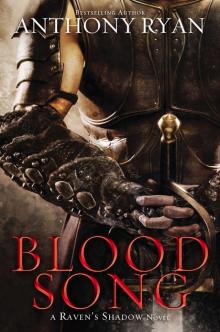 Blood Song
Blood Song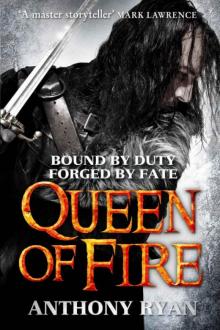 Queen of Fire
Queen of Fire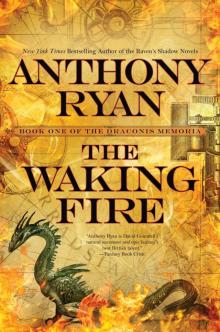 The Waking Fire
The Waking Fire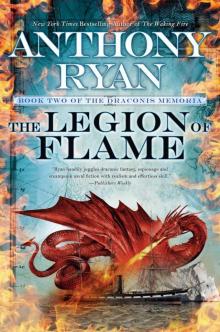 The Legion of Flame
The Legion of Flame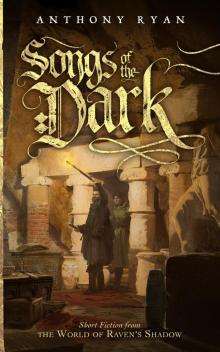 Songs of the Dark
Songs of the Dark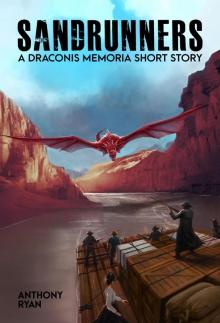 Sandrunners--A Draconis Memoria Short Story
Sandrunners--A Draconis Memoria Short Story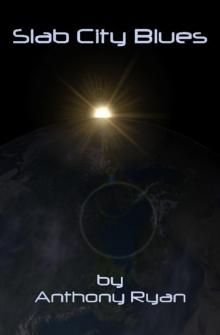 Slab City Blues
Slab City Blues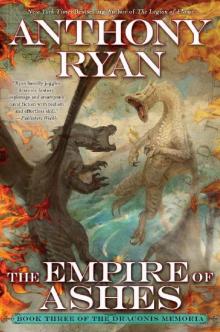 The Empire of Ashes
The Empire of Ashes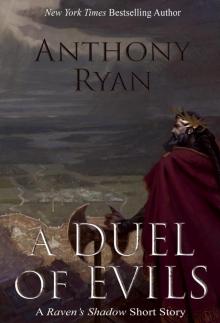 A Duel of Evils
A Duel of Evils The Pariah
The Pariah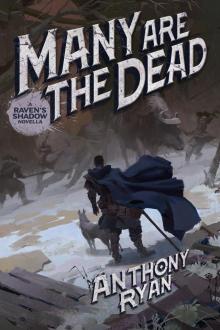 Many Are the Dead
Many Are the Dead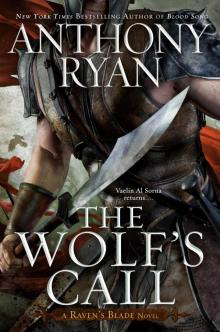 The Wolf's Call
The Wolf's Call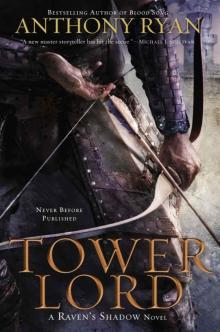 Tower Lord (A Raven's Shadow Novel)
Tower Lord (A Raven's Shadow Novel)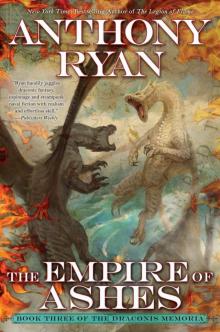 The Empire of Ashes (The Draconis Memoria)
The Empire of Ashes (The Draconis Memoria)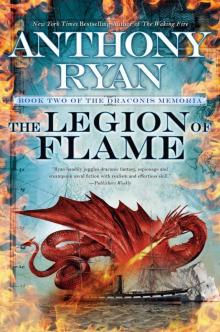 The Legion of Flame (The Draconis Memoria)
The Legion of Flame (The Draconis Memoria)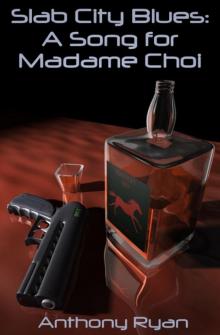 Slab City Blues: A Song for Madame Choi
Slab City Blues: A Song for Madame Choi